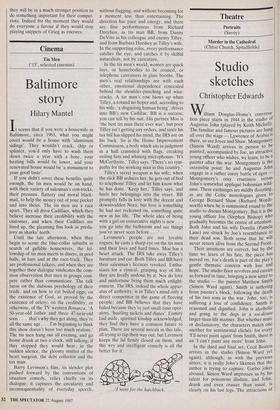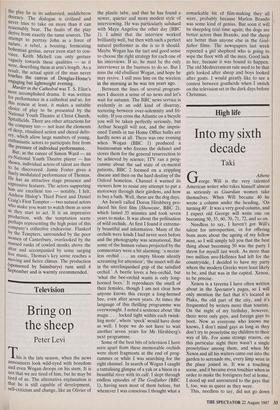Theatre
Portraits (Savoy) Murder in the Cathedral (Christ Church, Spitalfields)
Studio sketches
Christopher Edwards
William Douglas-Home's conversa- tion piece starts in 1944 in the studio of Augustus John (played by Keith Michell). The familiar and famous pictures are hung all over the stage — Lawrence of Arabia is there, so are Joyce and Shaw. Montgomery (Simon Ward) arrives in person to be painted, accompanied by Joe, an attractive young officer who wishes, we learn, to be a painter after the war. Montgomery is the ostensible point: he and Augustus John engage in a rather corny battle of egos Montgomery's cosy crustiness versus John's somewhat appliqué bohemian wild- ness. These exchanges are mildly diverting, as are the Celtic monologues given to George Bernard Shaw (Richard Words- worth) when he is summoned round to the studio to discuss Montgomery. But it is the young officer Joe (Stephen Bishop) who gradually becomes the centre of attention. Both John and his wife Dorelia (Pamela Lane) are struck by Joe's resemblance to their dead son. Both sense that he will never return alive from the Second Front.
Their intuitions are correct, but by the time we learn of his fate, the piece has moved on. Joe's death is part of the play s gentle thematic concern with loss and hope. The studio floor revolves and carries us forward in time, bringing a new sitter to the studio — the painter Matthew Smith (Simon Ward again). Smith is suffering from painter's block, following the death of his two sons in the war. John, too, is suffering a loss of confidence. Smith is reasoned and dignified, John is alcoholic and going to the dogs in a soi-disant larger-than-life manner. But whether mute or declamatory, the characters match one another for sentimental clichés: for every 'I'll never paint again' from Smith,
there is an 'I can't paint any more' from John.
In the third and final act, Cecil Beaton arrives in the studio (Simon Ward yet again), although, as with the previous sitters, it is really John's likeness that the author is trying to capture. Garbo jokes abound, Simon Ward impresses us by his talent for poisonous disdain, and John, drunk and even crasser than usual, is clearly on his last legs. The attractions of the play lie in its unhurried, middlebrow decency. The dialogue is civilised and never tries to take on more than it can reasonably bear. The faults of the play derive from exactly the same sources. The attempt to portray John as a force of nature, a rebel, a boozing, fornicating bohemian genius, never even start to con- vince. Keith Michell can only gesture vaguely towards these qualities — as it were, describing them at arm's length. As a result, the actual spirit of the man never touches the canvas of Douglas-Home's engaging but lightweight evening. Murder in the Cathedral was T. S. Eliot's most accomplished drama. It was written for performance in a cathedral and so, for this reason at least, it makes a suitable choice of play to be presented by the National Youth Theatre at Christ Church, SPitalfields. There are other attractions for the company too — not least the elements of deep, ritualised action and choral deliv- ery, which allow large numbers of young, enthusiastic actors to participate free from the pressure of individual performance. But, as the career of Simon Ward — an ex-National Youth Theatre player — has shown, individual actors of talent are there to be discovered. Jamie Foster gives a finely modulated performance of Thomas. He has an attractive stage presence and expressive features. The actors supporting him are excellent too — notably, I felt, Andrew Hislop's Third Priest and Daniel Craig's First Tempter — two natural actors who make you want to watch them as soon as they start to act. It is an impressive production, with the temptation scene perhaps representing the high point of this company's collective endeavour. Flanked by the Tempters, surrounded by the poor women of Canterbury, overlooked by the massed ranks of cowled monks above the altar and accompanied by some surging live music, Thomas's key scene reaches a moving and fierce climax. The production (sponsored by Sainsburys) runs until 4 September and is warmly recommended.











































 Previous page
Previous page